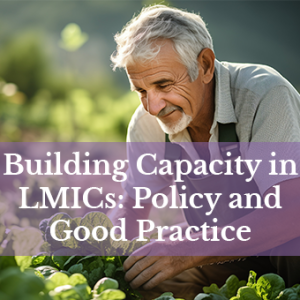
Developing a Geriatric Medicine Training Programme in Rapidly Ageing Small Island Developing States: A Caribbean Experience
Presenter(s):
Kayon Donaldson-Davis; Adrienne Thompson; Douladel Willie-Tyndale; Tanya Edwards; Denise Eldemire-Shearer, Mona Ageing and Wellness Centre, UWI, Mona , Jamaica
Abstract
Background: Within the small island developing states (SIDS) of the Caribbean, the need for health professionals with expertise in geriatrics and gerontology outweighs the availability of this cadre of staff in the Caribbean. International Plans of Action and Charters have referred to geriatric training as a priority issue. While Jamaica has made some strides towards prioritizing geriatric education and training programmes, there are limited options for medical doctors. This paper describes the development of a postgraduate diploma in geriatric medicine programme that meets the needs of doctors across the Caribbean and explores the perception of the first two cohorts of graduates about their course experience.
Methods: Clinicians with experience in the practice of geriatric medicine, gerontology, and university teaching and administration led the programme development team. A comprehensive search to identify existing postgraduate geriatric training offerings for physicians at universities in the Caribbean and internationally yielded no Caribbean-based programmes. A curriculum review of identified programmes was performed to guide the establishment of clinical competencies and to ascertain applicability to the existing models of care and local training needs. Consultations were held with key stakeholders. The initial programme capacity of eight (8) was guided by the availability of infrastructural and human resources with the view for incremental annual increase in student enrollment. We reviewed application and admission data to ascertain the number of applications, offers, and uptake of offers for the first two years of the programme. Academic performance and throughput rates were calculated and exit interviews were conducted as well as a course experience survey offered to all students.
Results: The programme was written between September 2018 and May 2020. Content was re-oriented to fit the needs of a medical doctor at the primary care level. Across the first two (2) years of the programme, nineteen (19) valid applications were received, with an acceptance rate of 68%. Accepted doctors resided in five Caribbean countries. The education and course objectives were met through seven taught courses and clinical rotations at local hospitals within the applicant’s home country. Throughput rates were 57.1% for year 1 and 100% for year 2. All students who completed the survey agreed that they were satisfied with the programme overall. Most (5 of 6, 83%) agreed that the course material felt novel with all persons indicating that half or more was novel. Everyone agreed that they were able to apply knowledge or skills from the programme to enhance their clinical practice and improve their communication. Participants agreed that the programme was helpful in developing six of seven attributes that are central to delivering quality care to older adults. Grade point averages (GPAs) across all courses ranged between 3.0 – 4.0.
Conclusion: The development and implementation of a postgraduate training programme in geriatric medicine in a SIDS is feasible and fills a training gap for medical doctors. This programme has been beneficial to participants and there is scope for programme expansion to meet the growing demand for geriatrics trained doctors in the Caribbean.
Bio(s):
“Dr. Adrienne Thompson is a lecturer at the Mona Ageing and Wellness Centre (MAWC), part of The University of the West Indies, Mona Campus. With a background in gerontology and public health, she is a team member in advancing MAWC’s mission to enhance the health and well-being of older adults across Jamaica and the Caribbean. Dr. Thompson contributes to the Centre’s comprehensive training programs, including the Post Graduate Diploma in Gerontology and the Master of Public Health with a specialization in Gerontology, which are designed to equip professionals with the skills necessary to address the complex needs of ageing populations.
Her academic and professional endeavours are deeply aligned with MAWC’s four strategic pillars: research, training, outreach, and policy influence. Dr. Thompson actively engages in research initiatives that inform national policies and community-based interventions aimed at promoting healthy ageing.
As a speaker at the IFA’s 17ᵗʰ Global Conference on Ageing, Dr. Thompson brings insights into the challenges and opportunities associated with an ageing population in a small island developing country, drawing from her experience in education, research, and policy development.
Dr. Kayon Donaldson-Davis is a dedicated public health professional and researcher based at the Mona Ageing and Wellness Centre at the University of the West Indies (UWI), Mona Campus, Jamaica, where she works as a lecturer and medical doctor. Her work focuses on ageing, community health, and the social determinants of health. She contributes to academic instruction which has lead to the development of a geriatric training programme for medical doctors, launched in January 2021. Her work includes outreach, policy development and applied research, particularly in areas related to gerontology, geriatrics and community-based health interventions. Her research spans a range of topics, including the impact of non-communicable diseases (NCDs) on older adults in Jamaica, caregiver burden and support systems for the elderly, long-term care, community responses to public health crises, such as COVID-19. Dr. Donaldson-Davis has co-authored several publications in peer-reviewed journals, contributing valuable insights into the health challenges and needs of Jamaica’s ageing population. Beyond academia, she actively participates in public education initiatives in various fora. She continues to play a pivotal role in advancing the understanding of ageing and community health in Jamaica, bridging the gap between research, training and practical health solutions.”
